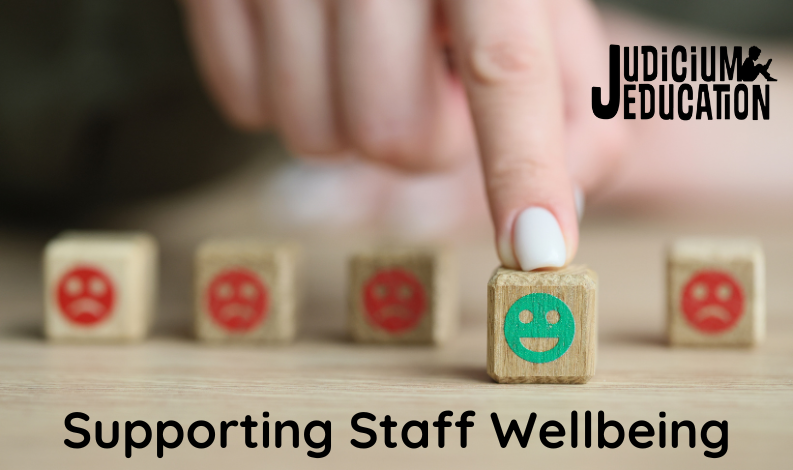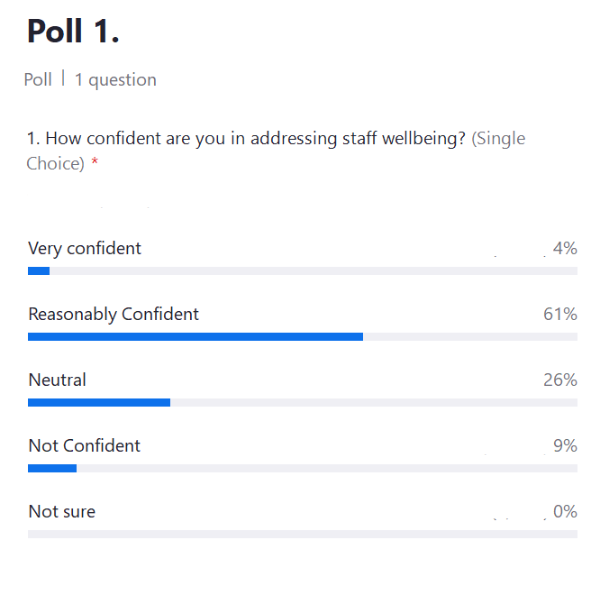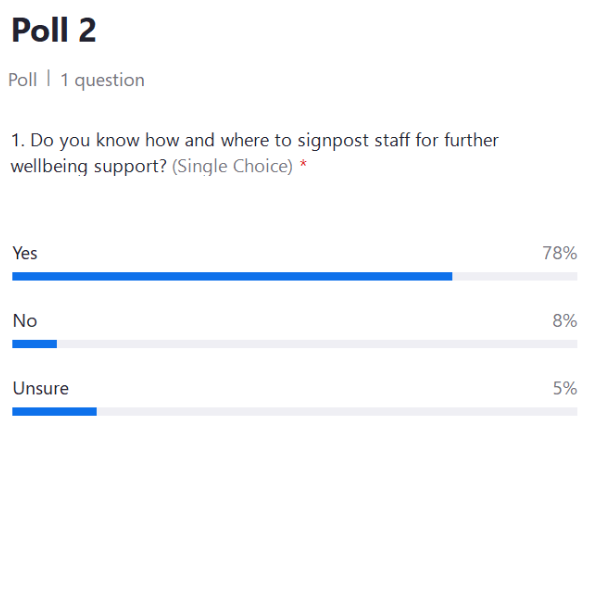Employment Law: Top Tips for Supporting Staff Wellbeing in the Workplace

What do we mean by wellbeing at work?
Workplace wellbeing relates to how workers feel about themselves and their work.
At its heart, workplace wellbeing aims to ensure workers are safe, healthy, satisfied and engaged.
It focuses on preventative action to reduce the incidence of stress, injury and overwhelm.
Poll 1
7 Key Areas of Wellbeing
1. Environmental
A pleasant working environment helps employees feel positive about their work.- Safe place
- Productive space
2. Emotional
- Positive relationships
- Personal resilience training
3. Values/Principles
Are your organisations core values aligned to those of your employees?- Clear mission statement
- The same ethos across the organisation
4. Health
Employees cannot work if they are suffering from injury or ill health.- Promote a healthy lifestyle.
- Encourage healthy eating across the whole school, e.g., change what vending machines you have on offer or the lunch options available, put posters up about healthy eating and lifestyle changes.
5. Intellectual
Personal growth- Career development opportunities
- Mentoring/ coaching
- Positive performance management / appraisals
6. Social
Relationships- Culture of mutual respect
- Positive professional relationships at work
- Teamwork/team building opportunities
- Dignity and respect
- Sense of belonging and purpose for every employee
7. Financial
Monetary and benefits- Equal pay – Have a clear Pay Policy and signposting to STPCD if relevant.
- Fair and identified pay bands.
- Transparent and clear identified TLR points
- Signpost to free financial support (citizens advice)
Legal Obligations
-
Health and Safety Regulations: Adhere to health and safety regulations, providing a safe working environment, regular risk assessments, and necessary safety equipment. Safe working environment. (Environmental)
-
Anti-Discrimination Laws: Ensure compliance with anti-discrimination laws to create an inclusive workplace, preventing discrimination based on age, gender, race, religion, or disability. (Values and Principles)
-
Workplace Harassment Policies: Establish clear policies to prevent workplace harassment, including sexual harassment, bullying, and any other forms of intimidation or offensive behaviour. (Emotional and Values and Principles)
-
Family-Friendly Policies: Offer family-friendly policies, such as parental leave, flexible working hours, and childcare support to help employees balance their professional and personal responsibilities. (Financial, Social)
-
Fair Compensation and Benefits: Ensure fair compensation and benefits packages that meet or exceed legal requirements, providing employees with a living wage and necessary benefits (Financial)
-
Whistleblower Protection: Implement policies that protect employees who report unethical behaviour or violations, ensuring they are shielded from any retaliation for their actions. (Values and Principles, Social, Emotional)
-
Training and Development: Provide opportunities for professional development and training, enabling employees to enhance their skills and grow within the organization. (Intellectual)
NB: These are just a few of the legal considerations should employees feel their wellbeing has not been supported within the workplace and these areas are not met, may result in costly employment law tribunals.
Poll 2
5 Top Tips
1. Don’t delay! Address concerns early!
- Address concerns as soon as possible, ideally when you are made aware of them.
- If you don’t act the problem will only get bigger.
2. Arrange to meet (in any format)
- Cup of tea in the staff room, on the spot chats if you notice anything which raises concerns.
- Ask them to pop in after a lesson.
- Draft a quick email asking them to come for a chat.
- Verbal invitations
- Online face-to-face, over-the-phone, email correspondence or walk-in meetings
- Physical environment - noise, light, dark, shared office, social space
- Give thought to the room layout.
3. Prepare
- Know what information you want to gain before the meeting.
- Have any evidence or information to support the matter at hand.
- Know your options - what can you offer in support?
- Talk to relevant line managers and employee’s support networks.
- Gather as much information as you can before the meeting.
- Know your audience.
- Ensure the employee knows what you want to discuss.
4. Listen
- Keep eye contact.
- Take notes if possible.
- Response to pauses for information – “I see”, “I understand,” “ok”, “go on”.
- Repeat back what you have heard to clarify your understanding,
- Don’t always break the silence – give the employee time to process and think.
- Don’t jump in with solutions - just listen!
5. Follow Up
- Note down an overview of the meeting and actions agreed and send to the employee (via email).
- Set out your action plan and follow up with any actions agreed.
- Arrange to meet again to discuss how things are going.
- Have realistic expectations - be aware that one meeting will not fix everything.
- Ask for feedback.
- Keep in touch with the employee about this issue/issues. It's important not to forget after the meeting.
Wellbeing Suggestions Shared by Schools during Live Sessions
-
We have flexi mornings/afternoon for all staff. Initially it was in place for teachers only, but we expanded it to all staff this year.
-
We have a whole staff lunch each term, where all the different departments come together just so we get to see staff we wouldn't usually see day to day.
-
We do a day at home planning, preparation and assessment for teachers and an AM/PM session at home for senior leaders, as their wellbeing is often forgotten.
-
Launched "Tap in" Tap out" - Monday the wellbeing champion sends a message to their staff checking how they are. Then Tap out on a Friday to ask how their week has been.
-
We have a staff breakfast briefing every week where teams take a turn to provide breakfast. We also have a fridge dedicated to staff to help themselves where food is put in there by HT and other staff.
-
We offer one paid wellbeing day a year for all staff members.
-
Half termly wellbeing sessions that staff run. They are usually baking or Art/craft related. They are after school and incur a small charge for equipment and then extra money goes to a charity. It's a chance for staff to come together and relax while raising money for charity. They are usually well attended and there is always cake!
-
A wellbeing support group that plans events for staff who want to join in.
-
We have launched our wellbeing champions. A member of staff from each area in school responsible for checking in with staff and directing them to extra help if they need it. Half-termly meetings to check how things are going.
-
We have a wellbeing committee where we share ideas and plan seasonal activities across the year (with a small budget!). Sometimes a little goes a long way though!
-
My old school did 'secret angels' - each staff member had a person (secret) they looked out for, and if it looked like they were having a hard time, or just to give them a boost, they would pop a choc bar on their desk, or write an appreciative note, or sneak a cuppa onto their desk. Budget of £20 for the year, so not huge expense.
-
Our Trust offers a wellbeing retreat for all staff. It's a great opportunity for our MAT to come together and practice mindfulness, eat delicious food, go for walks and recharge.
-
Wellbeing Wednesday and Feelgood Fridays - offering snacks, sweet treats or breakfast.
-
We have a wellbeing week once every half term where staff can leave as soon as the children have gone home. We also have a kindness board in the staff room where staff can say thank you and highlight kindness around the school
-
We have dress down Fridays for staff, and occasionally have a breakfast provided during Friday briefing. We also have a staff 'shout out' board in the staffroom where we can nominate colleagues who have done something over and above for us. The names on the board are put into a bowl on a Friday, and 2 names are drawn out to win a bottle of wine or box of chocolates.
- Our school has a wellbeing app that gives staff medical support, health and fitness discounts and even access to therapy.
Helpful Info:
If you’d like to review Judicium’s forthcoming sofa sessions for next term please click here
Follow us on Twitter: @JudiciumEDU
© This content is the exclusive property of Judicium Education. The works are intended to provide an overview of the sofa session you attend and/or to be a learning aid to assist you and your school. However, any redistribution or reproduction of part or all of the contents in any form is prohibited. You may not, except with our express written permission, distribute or exploit the content. Failure to follow this guidance may result in Judicium either preventing you with access to our sessions and/or follow up content.
Related content
(4).png)
The latest ERA implementation explains the imminent changes to trade union legislation, and several things that schools, trusts and colleges should do now to prepare.
.png)
On Tuesday 16th December 2025, the Employment Rights Bill was finally passed in Parliament and today, it has received Royal Assent! It is now the Employment Rights Act 2025.
(1).png)
On 27 November 2025, the UK government altered a flagship commitment in the Employment Rights Bill and dropped plans to grant most workers protection from unfair dismissal from their first day of employment. Instead, the Bill will now grant unfair-dismissal rights after six months of continuous service. Read this blog to uncover the reasons why, what this means for schools and how we can help.
(2).png)
In this post, we look at the four ERB Consultations that have been launched by the government and set out links to the consultations so that you can have your say.
.png)
Whats New | Sofa Sessions | HR
In this blog, we'll share the summary notes from our HR and Employment Law Sofa Session from the 19th November, delivered by our resident expert, Kirstie Young.
.png)
In this blog, we will explore the significance of enhancing performance and best practice in education and how it can be implemented effectively.



Whats New | HR